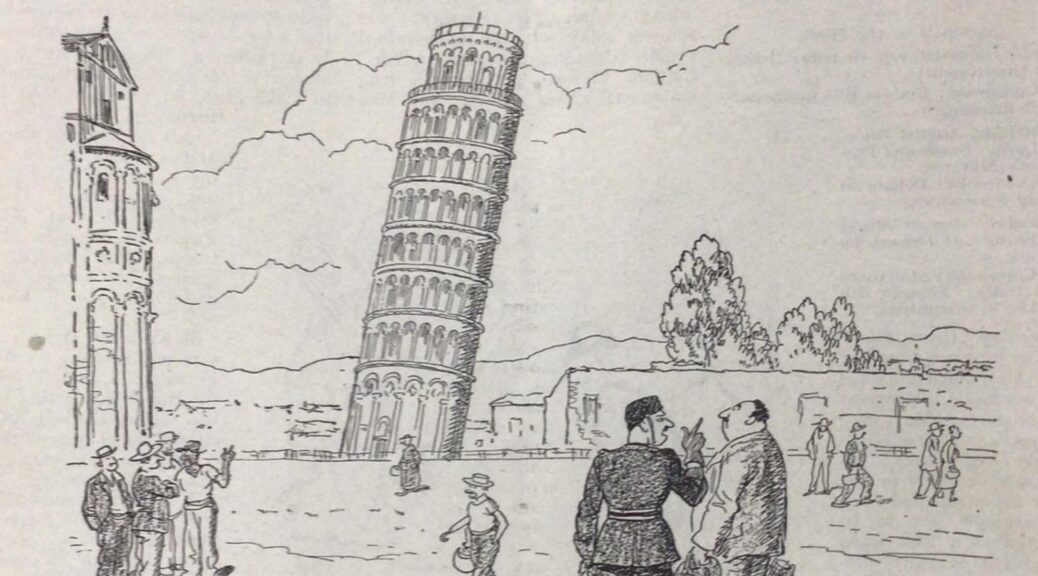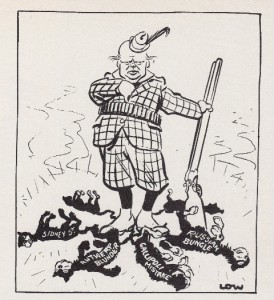
Get Ready for Churchill’s Anti-Sesquicentennial
“Very often the eagles have been squalled down by the parrots.” —WSC, 1945
* * * * *
(Updated from 2022.) Seasoned Churchillians had mixed reactions to the last celebration: the 50th anniversary of Winston Churchill’s death. While gratified that press and public still remembered, we were shocked at some of the ill-considered, long-disproven assertions. That was in 2015. This year marks the Sesquicentennial of his birth—and if you think 2015 was shocking, load up on Prozac.
Fortunately, Sesquicentennial attacks will be blunted by vast recent pushback from serious historians who’ve rebutted the worst slanders. So hopefully, the parrots will not squall down the eagles.
Call this a preemptive strike: with links to places where you can find the truth….
Sesquicentennial chestnuts
“The Ten Greatest Controversies of Winston Churchill’s Career,” (BBC)
This has always been a popular performance. The tactic is well-worn. First, you tee-up Churchill as the savior of 1940. Then you tear him down with the familiar litany of charges. I do wish they’d come up with some new ones; the old chestnuts are getting shopworn.
One doesn’t mind the Britain Bashing Corporation floating harmless urban legends (“poison” gas, strikebusting, payola). But to offer Churchill’s supposed racist views, the rude things he said about Gandhi (but not the nice things–or what Gandhi said about him), or the Sidney Street episode as examples of the “top ten” is intellectually vacant.

The real controversies of Churchill’s career include the Dardanelles (but not Gallipoli), intervention in Russia, reorganizing the Middle East, the Gold Standard, Disarmament, the Rhineland, the Abdication of Edward VIII, Munich. Singapore, strategic bombing, the atomic bomb, and postwar summits with the Russians, among others.
On these there is much legitimately to say in criticism as well as in praise. (Click on the links above for reliable information.)
Perhaps the BBC was catering to its perceived audience, which dotes on popular canards. They’ll probably try some of these again on his Sesquicentennial.
Eagles reply
“We shall fight them on the BBC”
This was a mock interview of Churchill, striving to answer some of the detractors. It is more amusing than the usual defenses. Sadly, though, author Richard Littlejohn was careless with his quotations.
Churchill never said he could only deal with one s*** at a time. And “Jaw-jaw is better than war-war” was said by Harold Macmillan, not WSC.
Still, it was entertaining to read that his words, “an Iron Curtain has descended across the continent”—applied to the European Union. Whoops!
True words of wisdom
One misses the company of eagles. Sir Martin Gilbert and Lady Soames regularly confronted these stories. But no one has the energy to tackle them all.
I was always encouraged by a wise and balanced historian, the late and much missed Professor Paul Addison, whose books on Churchill remain standard works:
Don’t worry about attacks on Churchill. He is alive and kicking and haunts the British imagination like no other 20th century politician.
He will always be caricatured, as he was in his lifetime. But freedom of speech and expression was one of the things he fought for, and in his time he gave as good as he got.
The more provocative comments about him are a backhanded tribute, as they work on the assumption that most people admire him.
My own personal view is that he was even greater as a human being than he was as a politician—a role in which he did make mistakes, as we all do.
Further reading
“Current Contentions: Surrender Nothing, Defend the Whole,” 2021. Part 1 and Part 2.
“Hearsay Doesn’t Count: Churchill’s Racist Epithets are Remarkably Rare,” 2020.
“The Myth of Dresden and ‘Revenge Firebombing,'” 2023.
“Bucknell University’s Panel on ‘Churchill: Hero or Colonialist,'” 2022.
“Brian Cox as Churchill: An Interview on Charlie Rose,” 2017.
Paul Rahe, “Review of Winston Churchill, Myth and Reality,” 2017.







One thought on “Get Ready for Churchill’s Anti-Sesquicentennial”
I very much enjoyed your “preemptive strike” in well warranted anticipation of the calumnies that will be told about Churchill on his Sesquicentennial. One comment in particular by professor Addison struck a chord with me as I would say that it sums up my own view of Churchill about as well as can any single sentence.
“My own personal view is that he was even greater as a human being than he was as a politician—a role in which he did make mistakes, as we all do.”
Or as you wrote in regard to Addison’s remarks in “Churchill by Himself”, p. 506;
What strikes me about these quotations as a group is what one of his secretaries said about Churchill: “He was so human, so funny—that always saved the day.” Interestingly, Sir Fitzroy Maclean had the same view: “I once asked a wartime ally. Marshal Tito, a most perceptive man, what most struck him about Churchill. ‘His humanity,’ Tito said immediately. ‘He is so human.'”
I have personally been a great fan of Winston Churchill since I began learning about his life and accomplishments some forty years ago. I’ve recommended the study of his life to many people since then and always describe it as a way to learn what real greatness is. And by greatness I was always referring not to his specific accomplishments, legion as the are, but rather to the superlative example of how well a life can be lived. His courage, fortitude, honesty, hard work and devotion to not only the people of Britain but to the freedom of people everywhere are well known. Yet his perseverance when the going was tough even in the depths of real human despair, showed the depth and greatness of his character and can serve as an inspiration to anyone struggling with the challenges we all face in life. In all his actions we can recognize that a real human being is at work. I think this is similar to what Professor Addison meant.
Comments are closed.